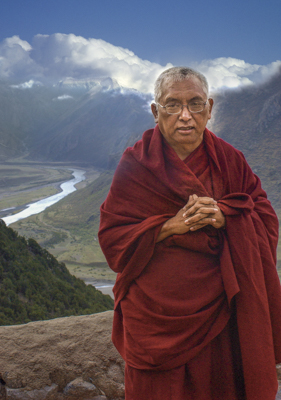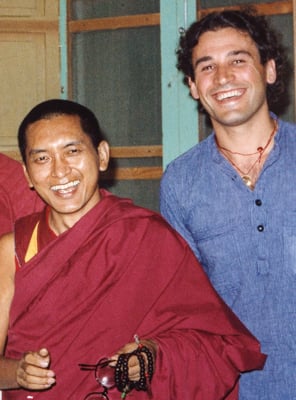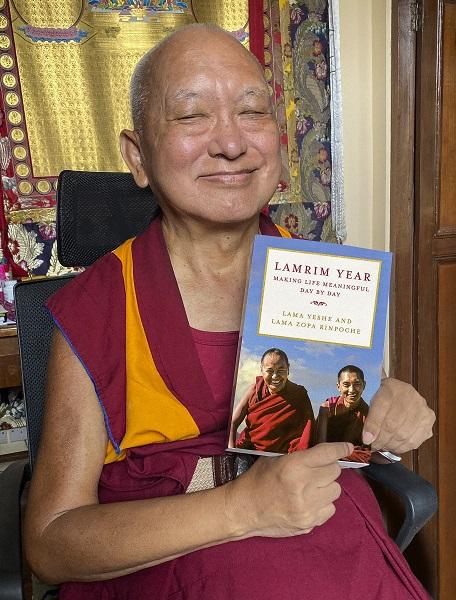Dear Friends,
From the LYWA Video Archive: The Infinite Potential of the Mind
This month from the video archive we present a public talk given by Lama Zopa Rinpoche in Brisbane, Australia on September 4, 1991. In this excerpt Rinpoche describes the structure of mind, explains how the mind works, explores where the mind can go and marvels at its infinite potential.
Visit and subscribe to the LYWA YouTube channel to view dozens more videos freely available from our archive. See also the FPMT YouTube channel for many more videos of Lama Zopa Rinpoche’s teachings.
New on the LYWA Podcast: Karma and Purification
 By being aware, by knowing about negative karma and all the suffering results, we are persuaded to practice purification.
By being aware, by knowing about negative karma and all the suffering results, we are persuaded to practice purification.
—Lama Zopa Rinpoche
This month on the LYWA podcast we bring you teachings by Lama Zopa Rinpoche on karma and purification given during the 36th Kopan Meditation Course at Kopan Monastery, Nepal in 2003. In this session, Rinpoche reminds us of the many kinds of negative karma we constantly accumulate and why it is so vitally important to practice purification every single day. Read along with the transcript of these teachings on our website.
The LYWA podcast contains hundreds of hours of audio, each with links to the accompanying lightly edited transcripts. See the LYWA podcast page to search or browse the entire collection by topic or date, and for easy instructions on how to subscribe.
WHAT'S NEW ON OUR WEBSITE
 This month we have posted Lecture 12 from Teachings at the Kadampa Deities Retreat held at Institut Vajra Yogini, France, in April-May 2003. In this lecture, Rinpoche discusses the power of mantras and holy objects, and explains the four aspects of karma, which determine whether we have happiness or suffering now and in the future. You can read an excerpt below, in our monthly teaching.
This month we have posted Lecture 12 from Teachings at the Kadampa Deities Retreat held at Institut Vajra Yogini, France, in April-May 2003. In this lecture, Rinpoche discusses the power of mantras and holy objects, and explains the four aspects of karma, which determine whether we have happiness or suffering now and in the future. You can read an excerpt below, in our monthly teaching.LAMA ZOPA RINPOCHE'S ONLINE ADVICE BOOK
 Every month we share new advices for Lama Zopa Rinpoche’s Online Advice Book, adding more than 100 new entries every year on a variety of topics. There are now more than 2,200 of Rinpoche’s precious advices online! Read on to learn what new additions we have to share with you this month:
Every month we share new advices for Lama Zopa Rinpoche’s Online Advice Book, adding more than 100 new entries every year on a variety of topics. There are now more than 2,200 of Rinpoche’s precious advices online! Read on to learn what new additions we have to share with you this month:- Few Students at the Center: A student and teacher at a Dharma center wrote that only a few people were attending teachings and they wondered if it was still beneficial to stay and teach there. Rinpoche sent this advice.
- Freedom from the Prison of Samsara: Rinpoche wrote this letter to a new nun advising the importance of renouncing the eight worldly concerns and meditating on impermanence and death.
- Welcome to Enlightenment: A student requested practices for life. Rinpoche advised a Highest Yoga Tantra practice, as well as the Method to Transform and lamrim study, in order to actualize realizations of the path to enlightenment.
- Confession of Anger and Worry About Cognitive Decline: A student confessed that they had become angry toward Rinpoche after having taken initiations from him. The student was also worried about their declining memory and mental faculties.
You can always find a list of all the newly posted advices from Lama Zopa Rinpoche on our website.
New Spanish Translations
 Ediciones Dharma, a non-profit Spanish publishing house which specializes in Buddhist publications, has now translated and published the following LYWA titles:
Ediciones Dharma, a non-profit Spanish publishing house which specializes in Buddhist publications, has now translated and published the following LYWA titles:- Cómo practicar el dharma (How to Practice Dharma by Lama Zopa Rinpoche)
- Libertad por el conocimiento (Freedom Through Understanding by Lama Yeshe and Lama Zopa Rinpoche)
- El renacimiento humano perfecto (The Perfect Human Rebirth by Lama Zopa Rinpoche)
- El sol de la devoción, fuente de bendiciones (Sun of Devotion, Stream of Blessings by Lama Zopa Rinpoche)
- Morar en retiro (Abiding in the Retreat by Lama Zopa Rinpoche)

Director
THIS MONTH'S TEACHING: how living in morality Brings Peace
 The practice of purification is an emergency. We need powerful, powerful intensive purification all the time, every day, and we need to change our attitude. We need to change our attitude and our actions. There are two solutions to stop experiencing all those suffering results. Purifying the past negative karma, that’s one solution.
The practice of purification is an emergency. We need powerful, powerful intensive purification all the time, every day, and we need to change our attitude. We need to change our attitude and our actions. There are two solutions to stop experiencing all those suffering results. Purifying the past negative karma, that’s one solution.
The other solution is to live in the morality, to abstain from these [nonvirtues], to change our own actions. Therefore we started this tradition at Kopan during the one-month course, for the last two weeks taking eight Mahayana precepts, and this helped so much. This tradition started at Kopan, in the last two weeks taking eight Mahayana precepts. That becomes unbelievable, incredible benefit, protection for the life. Not only for this life’s peace and happiness, freedom, but all these coming future lives’ unbelievable peace and happiness. We can’t imagine that, from life to life, then as a result, enlightenment, because the precepts are taken with the bodhicitta motivation. I think taking eight Mahayana precepts, this practice has been widespread or done everywhere, and individually practiced, with some students taking this a few times each month, many times taking.
I remember a few years ago I mentioned, what did I say? I remember a few years ago I mentioned that at least each month the students should take the eight Mahayana precepts, at least two times a month, something like that. I think maybe I announced that. However, this practice is so widespread in the organization and individually, many students individually take the precepts again and again, and at the centers as a group, taking the eight Mahayana precepts, which started from the Kopan courses. Learning this from Kopan courses and then it started all over, in all the FPMT centers, I guess, in almost every center, I think.
So this helps, and even at the other times, if we are unable to practice morality but during the Kopan course for the last two weeks taking the eight Mahayana precepts, or in the West at the centers, when there are courses or special days taking eight Mahayana precepts as a group, I think it becomes the best refuge, the protection for all those coming future lives. Protection from suffering and to have all that peace and happiness, success.
Now here, with this way of meditating on karma, this way of analyzing karma, now here we can see that to stop one negative karma is an incredible profit for us, bringing happiness from life to life. Otherwise if we don’t stop, if we do it, then the suffering result goes from life to life without end, but if we abstain from that then we stop all those ongoing suffering results from life to life without end. So now we can see all this is the benefit, not only peace and happiness in this life for ourselves by living in this morality, but we’re giving peace, we’re making preparation for all those coming future lives to have peace and happiness, to not have those sufferings.
This is concerning our own happiness, but here, however many precepts are taken, we also stop that many harms to other sentient beings. That means we are giving that much peace and happiness to numberless sentient beings because we take vows. On the object, sentient beings, we take vows to not kill them, to not steal, to avoid sexual misconduct and so forth, therefore we stop harming numberless sentient beings. So they are receiving so much peace and happiness from us.
Now here you can see, on the basis of what I explained before, how things are coming from the mind. Every moment, the state of our mind—happy or unhappy, pleasant feeling or unpleasant feeling—it all came from the label that we put on the object, from our mind. What we see, what we hear, what we smell, all these, bad, good, whatever it is, all this is what is labeled by our mind, so it all came from our mind. Then after that we get pleasant feeling or unpleasant feeling, happy mind or unhappy mind, because it affects us. It comes from our mind, then like this we create and it affects back to our mind.
Therefore, the more positive the labels we put in our life, that means we have more happiness. We have more peace in our heart, more happiness. The more negative the labels we put, by our mind, then we see more negative things and we have a more unhappy mind.
The other thing I mentioned, the long-run evolution, how everything comes from, besides the seven results, then all the forms, sounds, smells, tastes in the daily life, how they come from our own mind, the consciousness, and karma and ignorance.
So now here, it’s more detailed, so now here it’s involved. The same description but more details. It’s still talking about how it came from our mind, when we go through the ten nonvirtuous actions and the ten virtuous actions, karma, so all these suffering results and happiness all come from [the mind.] From the good karma of abstaining from killing, abstaining from sexual misconduct and so forth, comes all the resultant happiness of future lives. In our future lives people in the office, people at home, everybody thinks the same way as we think, harmonized with our wishes. Everybody is very supportive of us and our other companion, our husband or wife, whoever it is, thinks exactly the same as us and always harmonizes with our wishes and supports us. So wherever we are, people are like that, very harmonious, so much peace and happiness, like one person, the way of thinking.
And then we always live in a very clean, beautiful place. So those places which we are enjoying now, the clean, beautiful places that we experience in this life, those are the result of the past good karma of living in the morality, abstaining from sexual misconduct, like that.
Then in the future lives again we are practicing morality, abstaining from sexual misconduct, like that. So all those happinesses which we experience from life to life, all come from our own good karma. So this comes from the mental factor of intention, sempa, which comes with the principal consciousness. There are five ways they harmonize [are concomitant]: the similarity of object, similarity in essence, anyway, I don’t remember everything now. So intention is one of the five omnipresent mental factors. It always accompanies the principal consciousness and functions on the same object. Similar time, similar to the object, similar essence, similar aspect. One is aspect?
So all this resultant happiness came from the good karma which is from our own mind, the mental factor of intention. And all those suffering results which I mentioned, the result of those negative karmas came from one’s own [mind]. The negative karma is also from our own mental factor, the intention. Then the root is ignorance. So again, all this came from ignorance. It didn’t come from outside, it came from our own mind.
So this is the way to meditate on the section on karma, the effective way to meditate.
An excerpt from teachings given by Lama Zopa Rinpoche at a retreat held at Institut Vajra Yogini, France, from 18 April to 11 May 2003. Lightly edited by Sandra Smith. You can find all twelve discourses here on our website.































